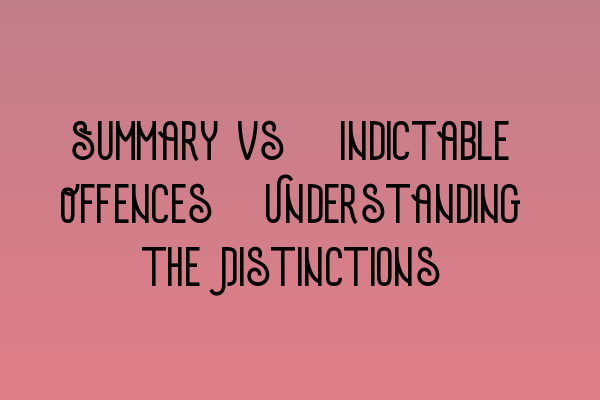Summary vs. Indictable Offences: Understanding the Distinctions
In the realm of criminal law, offences are typically classified into different categories based on their severity, complexity, and the manner in which they are tried. The two primary classifications are summary offences and indictable offences. Understanding the distinctions between these two types of offences is crucial for both legal professionals and individuals facing criminal charges, as it determines the legal procedures and potential consequences involved.
Summary Offences: Overview
Summary offences, also known as minor offences or misdemeanours, are less serious crimes that are usually heard in the lower courts. These offences are often considered less complex and are dealt with through streamlined legal procedures. Common examples of summary offences include petty theft, public intoxication, minor traffic violations, and disorderly conduct.
One key characteristic of summary offences is that they carry relatively lower penalties compared to indictable offences. The sentencing options for summary offences typically include fines, community service, probation, or short-term imprisonment. However, it’s important to note that even though the penalties are less severe, a conviction for a summary offence can still result in a criminal record.
If an individual is charged with a summary offence, they are generally not entitled to a trial by jury. Instead, the case is heard and decided by a magistrate or judge. However, individuals have the right to seek legal representation and present their case in court.
Indictable Offences: Overview
Indictable offences, also referred to as serious offences, are more grave crimes that require a more formal and extensive legal process. These offences are typically heard in higher courts, such as the Crown Court in England and Wales. Examples of indictable offences include murder, robbery, sexual assault, drug trafficking, and fraud.
Indictable offences are often characterized by their complexity, severity, and potential for substantial harm to victims or society. The legal procedures involved in handling indictable offences are more intricate compared to summary offences. They usually require more formal investigations, pre-trial hearings, and trials that involve the presentation of evidence and witness testimonies.
The penalties for indictable offences tend to be more severe, with potential sentences ranging from lengthy imprisonment to life sentences, depending on the nature and gravity of the offence. In some cases, the court may also impose fines or other ancillary orders like community rehabilitation orders or restraining orders.
Unlike summary offences, individuals charged with an indictable offence have the right to choose between a trial by jury or a trial without a jury. The decision will often depend on the complexity of the case, personal preference, and legal advice.
Differences and Considerations
The following are some key distinctions between summary and indictable offences:
- Severity: Summary offences are generally less serious compared to indictable offences.
- Legal Process: The legal process for indictable offences is more extensive and formal, involving trials, jury options, and complex evidentiary hearings.
- Penalties: Summary offences usually carry less severe penalties, such as fines, community service, or short-term imprisonment, while indictable offences can result in longer prison sentences.
- Choice of Trial: Individuals charged with an indictable offence have the option to choose between a jury trial and a trial without a jury.
- Legal Representation: Both summary and indictable offences allow individuals to seek legal representation to present their case effectively.
Conclusion
Understanding the distinctions between summary and indictable offences is essential for legal professionals and individuals involved in criminal proceedings. The classification of an offence determines the legal procedures, potential penalties, and the overall gravity of the case. Whether facing criminal charges or working within the criminal justice system, having a solid understanding of these categories helps ensure appropriate legal representation and a fair trial.
To learn more about criminal law in the UK and prepare for the Solicitors Qualifying Examination (SQE), consider exploring related articles:
